Related Research Articles

Erich Pommer was a German-born film producer and executive. Pommer was perhaps the most powerful person in the German and European film industries in the 1920s and early 1930s.
Cserépy Film was a German film production company which operated during the silent era. It was founded by the director Arzén von Cserépy. In 1922, it became affiliated with the much larger Ufa company, and in 1924, it was merged into it entirely. The company was notable for a number of epics it made, particularly the Fridericus Rex series of films about Frederick the Great which enjoyed enormous popularity with Weimar German audiences.
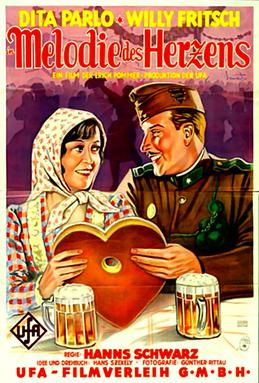
Melody of the Heart is a 1929 German musical film directed by Hanns Schwarz and starring Dita Parlo, Willy Fritsch and Gerő Mály.

The Farmer from Texas is a 1925 German silent comedy film directed by Joe May and starring Mady Christians, Willy Fritsch, and Lillian Hall-Davis. It was based on the play Kolportage by Georg Kaiser. The film was considered a costly box office failure, contributing to a financial crisis at Germany's largest studio Universum Film AG. The film's sets were designed by Paul Leni.

A Waltz Dream is a 1925 German silent drama film directed by Ludwig Berger and starring Willy Fritsch, Mady Christians and Xenia Desni. It was based on the 1907 operetta Ein Walzertraum composed by Oscar Straus. It was influential on the development of later Viennese operetta films. Unlike many of UFA's ambitious productions of the 1920s, A Waltz Dream managed to recover its production cost in the domestic market alone.
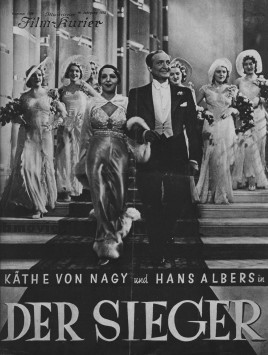
The Victor is a 1932 German comedy film directed by Hans Hinrich and Paul Martin and starring Hans Albers, Käthe von Nagy and Julius Falkenstein. A postal clerk loses his money gambling on horses, but eventually meets and falls in love with a wealthy man's daughter. It premiered on 23 March 1932 at the Gloria-Palast in Berlin.
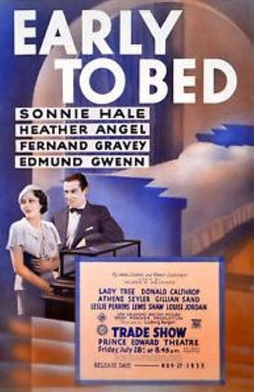
Early to Bed is a 1933 British-German romantic comedy film directed by Ludwig Berger and starring Heather Angel, Fernand Gravey and Edmund Gwenn.
Waltz of Love is a 1930 German musical film directed by Wilhelm Thiele and starring Lilian Harvey, Willy Fritsch and Georg Alexander. It was shot at the Babelsberg Studios in Berlin with sets designed by the art director Erich Kettelhut. It premiered at the Gloria-Palast in Berlin on 7 February 1930. A separate English language version The Love Waltz was also produced.
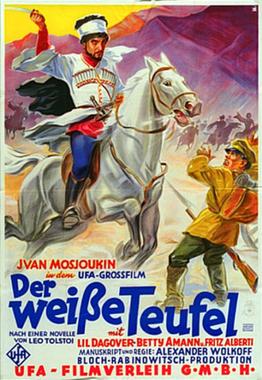
The White Devil is a 1930 German historical drama film directed by Alexandre Volkoff and starring Ivan Mozzhukhin, Lil Dagover and Betty Amann. It was based on Leo Tolstoy's 1912 novella Hadji Murat. It was originally made as a silent film, with a soundtrack added later. Anatole Litvak worked as the film's assistant director and production manager. It was shot at the Bebelberg Studios in Berlin. The film's sets were designed by the art directors Alexandre Lochakoff and Vladimir Meingard. After location shooting in Nice, Switzerland and the French Alps during 1929, it premiered at the Ufa-Palast am Zoo in January 1930.

Tobis Film was a German film production and film distribution company. Founded in the late 1920s as a merger of several companies involved in the switch from silent to sound films, the organisation emerged as a leading German sound studio. Tobis used the Tri-Ergon sound-on-film system under the Tobis-Klang trade name. The UFA production company had separate rights to the Tobis system, which it used under the trade name of Ufa-Klang. Some Tobis films were released in Germany by the subsidiary Europa Film.
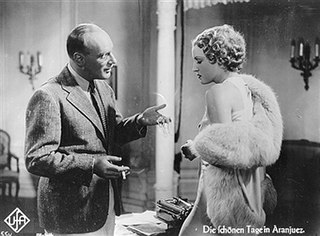
Happy Days in Aranjuez is a 1933 German comedy film directed by Johannes Meyer and starring Brigitte Helm, Gustaf Gründgens and Wolfgang Liebeneiner. The film focus on a notorious jewel thief operating in high society. The title refers to Aranjuez in Spain.
Staaken Studios was a film studio located in Staaken on the outskirts of the German capital Berlin. A large former zeppelin hangar, it was converted to film use following the First World War and operated during the Weimar Republic. In July 1923 it was the largest studio in the world, with floor space of around 18,000 square feet. It was used for the construction of massive sets on a series of major productions of the silent era, including I.N.R.I., Metropolis, The Holy Mountain and The Ship of Lost Souls. These epics were a part of the German attempt on world markets during the decade. The 1927 Anglo-German co-production The Ghost Train was shot at Staaken.
National Film or National-Film was a German film production and distribution company which operated during the silent and early sound era. In the early 1920s it made an attempt to take over Erich Pommer's Decla-Bioscop, but the projected merger failed and Decla instead joined with the major studio UFA. While Decla was generally in favour of joining with National, it was pressured by its creditors Deutsche Bank to merge with UFA.

Aafa Film or Aafa-Film was a German film production and distribution company which operated during the 1920s and 1930s. Established in 1920 as Radio-Film the company was controlled by the producer Gabriel Levy and the director Rudolf Dworsky. The company was one of the leading producers of the Weimar Republic, and survived the transition from silent to sound film in 1929. It made the first German full sound film It's You I Have Loved that year. During the early 1930s Aafa produced a number of mountain films directed by Arnold Fanck. It also made a multi-language version musical Lieutenant, Were You Once a Hussar? (1930).

The Tempelhof Studios are a film studio located in Tempelhof in the German capital of Berlin. They were founded in 1912, during the silent era, by German film pioneer Alfred Duskes, who built a glass-roofed studio on the site with financial backing from the French company Pathé. The producer Paul Davidson's PAGU then took control and constructed a grander structure. The First World War propaganda drama The Yellow Passport, the historical comedy Madame DuBarry and the expressionist 1920 silent film The Golem were made there by PAGU.
Decla-Film was a German film production and distribution company of the silent era, founded by Erich Pommer and Fritz Holz in February 1915.

The Marmorhaus is a former cinema located on the Kurfürstendamm in Berlin. Opened in 1913, it takes its name from a large marble façade. Designed by the architect Hugo Pál, the walls of the foyer and auditorium were decorated by the expressionist artist Cesar Klein.
The Johannisthal Studios were film studios located in the Berlin area of Johannisthal. Founded in 1920 on the site of a former airfield, they were a centre of production during the Weimar and Nazi eras. Nearly four hundred films were made at Johannistal during the silent period. The first production was the 1920 silent Verkommen starring Maria Zelenka. Sometimes known as the Jofa Studios, in 1929 they became the base of the newly established German major studio Tobis Film at the beginning of the sound era.
Ernst Hugo Correll was a German film producer active during the Weimar and early Nazi eras.